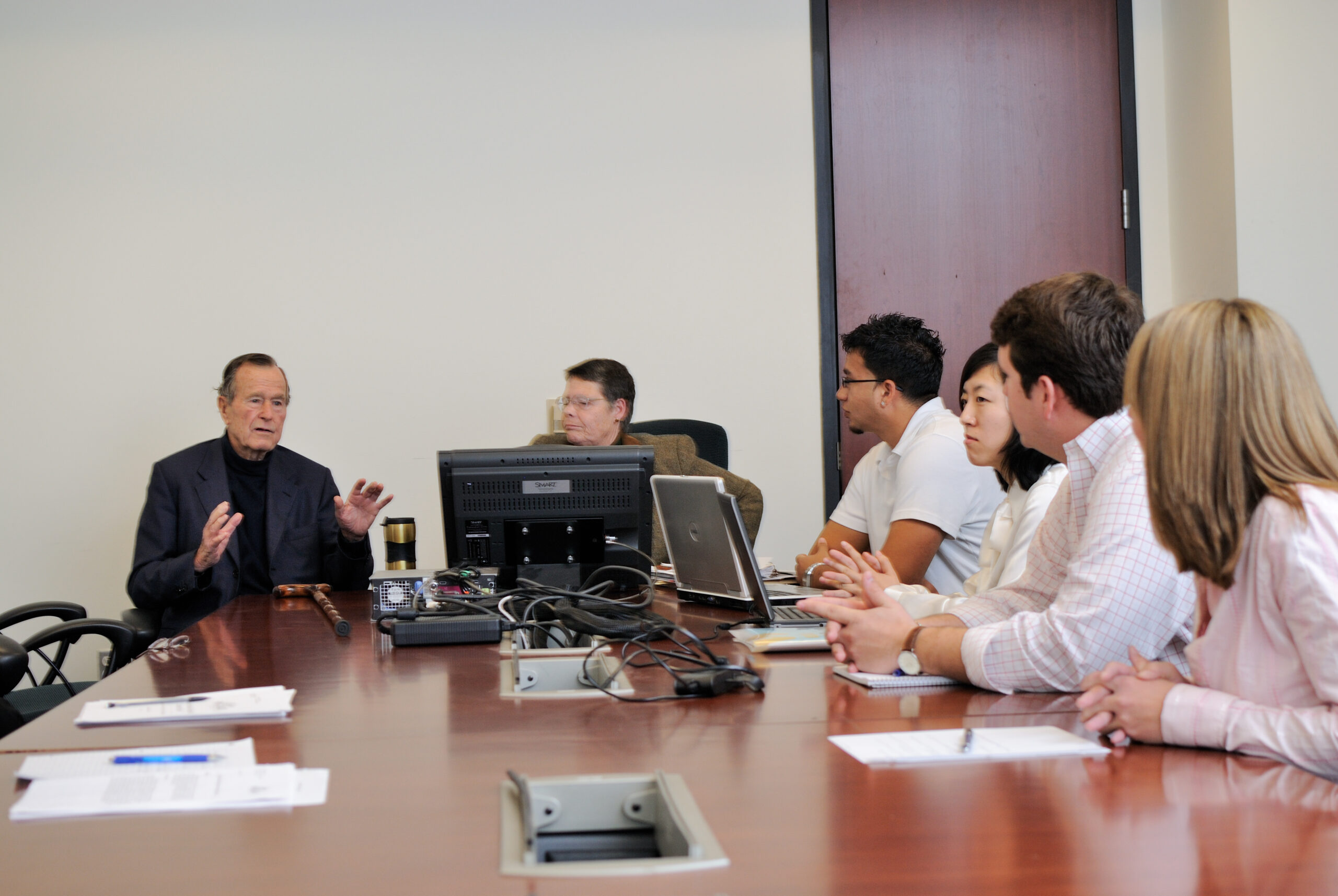
Once again, the Bush School’s founder has demonstrated continuing commitment to the Bush School and its mission of preparing future leaders for public service. During a week filled with a range of activities, the former president and Mrs. Bush found time to participate in Bush School classes, meet with the School’s advisory board and host a dinner honoring Dean Ryan Crocker.
Having a former president take an active part in your class can be intimidating for even the most well-prepared student. But President and Mrs. Bush always bring out the best in Bush School students, enhancing classroom learning with important insights and relevant experiences. Of course, when the President is on campus, there is always the opportunity to visit with him informally in the hallways. He is very approachable, and open to photos, most often taken with students’ cell phones.
While visiting, President Bush attended three classes. Students in professors Scott Robinson and Ann Bowman’s Public Management classes made a presentation on the Office of National Drug Control Policy (ONDCP) which was established under Mr. Bush’s administration. The presentation focused on the challenges confronting public managers when measuring performance in public service organizations. In preparation for the discussion, the students read a case study on the development of a performance measurement system in the ONDCP.
In addition to the chosen topic, the Q&A which followed included more personal topics, beginning with questions about the President’s health (“I’ve got no complaints,” he said). He then offered the students advice on living well.
“Never neglect your friends, and keep in touch with them throughout your life,” he said. “And do your best to keep your family going; that has given Barbara and me strength over the years because family is continuity and stability.” He added that their 65-year marriage has been “wonderfully rewarding,” and that Barbara is one-of-a-kind. “They broke the mold when they made her,” the President said. His advice to young people is to “take marriage seriously; take your time; be sure, and bring up your kids in a loving environment.”
When asked about leadership, President Bush said that his mother set an example, advising him as a young man to “work hard and give the other guy credit.” Senator Prescott Bush, the President’s father, also helped establish his value of public service. “Whenever he was asked to serve, he did,” said Mr. Bush.
As for public service, President Bush said he was “in love” with government service and he is delighted that these students are pursuing careers in public service. “As I’ve said before, public service is a noble calling, and Dean Crocker is a wonderful example of a dedicated public servant,” he added. “I hope you will leave this school with an idea that you want to serve—no matter the party or level of service. If you believe that service is noble, you will have a happy and successful life,” he concluded.
Both the President and Mrs. Bush attended Professor Jeffrey Engel’s class on U.S. foreign policy since 1945. A discussion of the book Containing Arab Nationalism: The Eisenhower Doctrine and the Middle East focused on whether there was a clash of civilizations and how decisions made under President Eisenhower had affected policy today. President and Mrs. Bush listened intently to the students’ discussion and President Bush actively participated in the discussion and questioning.
Dr. Sharon Caudle’s Capstone course on organizational resiliency after Hurricane Ike had particular relevance to President and Mrs. Bush. Dean Crocker also attended the class.
The students presented background information on two areas—Cameron Parish, Louisiana and the Bolivar Penninsula in Texas—that were devastated after Hurricane Ike, and they discussed the differences in development of the two communities following the storm. The Bush-Clinton Coastal Recovery Fund provided a grant for this Capstone project, enabling students to conduct research on long-term recovery and resiliency issues. Working with the officials and community members of the two communities, the students focused on shared and individual community long-term recovery and resiliency, economic development goals, policy options to meet these goals, and the strengths and weaknesses of each, including implementation challenges. As part of their presentation, the students noted the constraints on this research, and related how they collected and analyzed data and developed their statistical analysis.
President Bush said that this was a project “near and dear to my heart,” having seen the devastation of a storm first hand when he had worked in the offshore drilling business. Mrs. Bush was interested in how many schools had been built and if doctors returned to the communities.
As he did with all the classes, President Bush offered to pose for individual photos with the students, and his offer was eagerly accepted.
